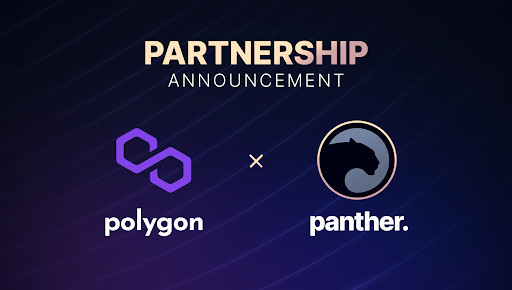
Panther and Polygon are Taking Privacy to New Heights in DeFi
Midtown, Gibraltar, 21st September, 2021,
Panther Protocol creates private scalable infrastructure for smart contract platforms, DeFi and Web3, and is delighted to announce a strategic partnership with Polygon, the Layer-2 scaling solution often referred to as “the Ethereum’s Internet of Blockchains.”
Panther Protocol, who is building their MVP on Polygon, aims to bring interoperable privacy and compliance friendly selective disclosure mechanisms to the Polygon network. Besides providing technical support, Polygon will help Panther collaborate with projects within its ecosystem in the development efforts of privacy features that empower end users. It will also aid our mission in giving institutions and fintechs a clear path into private and compliant DeFi.
Polygon and Panther both acknowledge the value of privacy as a basic human right. Panther leverages the zkSNARK technology to let users mint fully-collateralized, privacy enhancing zero-knowledge assets (zAssets) by depositing their digital assets from any blockchain into Panther vaults. They can then use zAssets across the DeFi ecosystem.
The MVP will allow the first Panther users to get acquainted with zAssets, which provide privacy by default whilst retaining DeFi composability. Minting zAssets can effectively be seen as a shielding mechanism, and burning as unshielding. It will be implemented via a small number of shielded privacy pools on Polygon, keeping balances of zAssets permanently backed 1:1 by native collateral in Panther vaults.
Expect to see in the Panther MVP:
- Shielding and Deshielding of assets – the foundation for zAssets to function
- Private transfer of assets
- Voluntary Full disclosure of selected transactions and their linkage
- Ability to interact with Panther via web wallet
- Panther Vaults
Why launch the MVP on Polygon?
Panther decided to launch our MVP on Polygon (formerly known as Matic) while the $ZKP token will be launched on Ethereum and use Polygon’s interoperable capabilities to bridge tokens over. The project chose Polygon because it has demonstrated its incredible technical capabilities, it has very low fees, which will allow the proper shielding of zAssets, and of course, because of its thriving and rapidly expanding DeFi ecosystem.
“Polygon’s approach brings scalable, low cost transactions to the Ethereum network as well as a burgeoning ecosystem of DeFi protocols already using their technology. Panther’s partnership will enable zAsset utility between all Panther users in a privacy preserving, scalable and regulatory compatible fashion – opening the doors for true institutional adoption and retail usage,” said Panther Protocol CEO Oliver Gale.
About Polygon
Polygon is a protocol and a framework for building and connecting Ethereum-compatible blockchain networks. Polygon aggregates scalable solutions on Ethereum, supporting a multi-chain Ethereum ecosystem and combines the best of Ethereum and sovereign blockchains into a full-fledged multi-chain system. Polygon solves pain points associated with Blockchains, like high gas fees and slow speeds, without sacrificing on security.
About Panther Protocol
Panther is an end-to-end privacy protocol connecting blockchains to restore privacy in Web3 and DeFi while providing financial institutions a clear path to compliantly participate in digital asset markets.
Panther provides DeFi users with fully collateralized privacy-enhancing digital assets, leveraging crypto-economic incentives and zkSNARKs technology. Users can mint zero-knowledge zAssets by depositing digital assets from any blockchain into Panther vaults. zAssets flow across blockchains via a privacy first interchain DEX and a private metastrate. Panther envisions that zAssets will become an ever-expanding asset class for users who want their transactions and strategies the way they should always have been: private.
Want to learn more about Panther?
Stay connected with Panther: Telegram | Twitter | Medium | LinkedIn | Website |
Contacts
- Gabriella Baer
- gabriella@pantherprotocol.io
